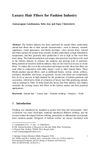 June 2023 in “Journal of cosmetic dermatology”
June 2023 in “Journal of cosmetic dermatology” Both DPCP alone and with PRP are effective and safe for treating severe alopecia areata.
 5 citations,
November 2022 in “Animal Genetics”
5 citations,
November 2022 in “Animal Genetics” Genomic research can help improve the quality and production of natural fibers in animals.
Different types of sun exposure damage skin cells and immune cells, with chronic exposure leading to more severe and lasting damage.
[object Object]  7 citations,
September 2022 in “Communications biology”
7 citations,
September 2022 in “Communications biology” Omega-6 fats in certain cells boost male hormone production.
 10 citations,
July 2022 in “Dermatology and Therapy”
10 citations,
July 2022 in “Dermatology and Therapy” Melasma's causes include genetics, sun exposure, hormones, and oxidative stress, and understanding these can help create better treatments.
3 citations,
January 1990 in “Springer eBooks” March 2024 in “Agriculture” CRISPR/Cas9 gene-editing shows promise for improving sheep and goat breeding but faces challenges with efficiency and accuracy.
 28 citations,
January 2021 in “Skin appendage disorders”
28 citations,
January 2021 in “Skin appendage disorders” COVID-19 may cause early hair loss similar to classic temporary hair loss, with further research needed.
 9 citations,
April 2016 in “Cutaneous and ocular toxicology”
9 citations,
April 2016 in “Cutaneous and ocular toxicology” Alpha Lipoic Acid helps protect skin from smoking damage.
 February 1960 in “Journal of the American Medical Association”
February 1960 in “Journal of the American Medical Association” Treatments for hair loss include estrogen therapy and special shampoos.
 December 1920 in “The Lancet”
December 1920 in “The Lancet” The document discusses various public health initiatives and societal issues, emphasizing early intervention and support.

Optical Coherence Tomography has potential in diagnosing hair loss and monitoring blood clotting, and could be improved for deeper tissue observation and better hair loss understanding.
 March 2024 in “International Journal of Cosmetic Science”
March 2024 in “International Journal of Cosmetic Science” Dandruff is linked to increased T cells and weakened immune protection in hair follicles.
 1 citations,
January 2019 in “International Journal of ChemTech Research”
1 citations,
January 2019 in “International Journal of ChemTech Research” Eclipta prostrata has many medicinal benefits, but more research is needed to understand how it works.
 April 1940 in “Archives of dermatology”
April 1940 in “Archives of dermatology” Diagnosing and treating skin conditions is challenging, especially when drug reactions mimic other diseases.
 1 citations,
January 2023 in “Burns & Trauma”
1 citations,
January 2023 in “Burns & Trauma” Wnt4 protein makes the outer skin layer thicker in burn wounds by turning on a specific healing pathway and loosening the connections between skin cells.
 June 2022 in “Authorea (Authorea)”
June 2022 in “Authorea (Authorea)” Efficient delivery systems are needed for the clinical use of CRISPR-Cas9 gene editing.
January 2016 in “프로그램북(구 초록집)” The growth factor cocktail with FGF9 significantly increased hair density and diameter in patients with androgenetic alopecia.
 July 2023 in “Stem Cells Translational Medicine”
July 2023 in “Stem Cells Translational Medicine” Mesenchymal Stem/Stromal Cells (MSCs) help in wound healing and tissue regeneration, but can also contribute to tumor growth. They show promise in treating chronic wounds and certain burns, but their full healing mechanisms and potential challenges need further exploration.
 19 citations,
October 1985 in “British Journal of Dermatology”
19 citations,
October 1985 in “British Journal of Dermatology” The document concludes that unruly hair can be congenital or acquired, often lacks specific treatments, and can be managed with oils and short hairstyles.
 9 citations,
January 1959 in “The journal of nutrition/The Journal of nutrition”
9 citations,
January 1959 in “The journal of nutrition/The Journal of nutrition” Higher potassium intake may protect against hair loss and liver fat in lysine-deficient rats.
 6 citations,
January 2016 in “Environmental footprints and eco-design of products and processes”
6 citations,
January 2016 in “Environmental footprints and eco-design of products and processes” The industry should promote pure luxury hair fibers, improve technology, and diversify products to support growers and ensure sustainable use.
 1 citations,
June 2021 in “Curēus”
1 citations,
June 2021 in “Curēus” A woman with hair loss had a benign sweat duct tumor found during a scalp biopsy.
 11 citations,
December 1921 in “Archives of dermatology and syphilology”
11 citations,
December 1921 in “Archives of dermatology and syphilology” A rare scalp disease causes hair loss, pus-filled nodules, and scarring.
 12 citations,
January 2014 in “Cell structure and function”
12 citations,
January 2014 in “Cell structure and function” Different combinations of human hair keratins affect how hair fibers form.
[object Object]  12 citations,
December 2021 in “Aging”
12 citations,
December 2021 in “Aging” A new painless method to collect hair follicles helps study DNA damage and aging.
 13 citations,
March 2018 in “Journal of Sociology”
13 citations,
March 2018 in “Journal of Sociology” The anti-ageing treatment market is growing by exploiting fears of ageing with unproven promises, which could harm public trust and genuine science.
 1 citations,
October 1935 in “Nature”
1 citations,
October 1935 in “Nature” Potassium iodide prevents hair loss and reduces toxicity from thallium acetate.
 5 citations,
December 2012 in “Journal of Dermatology”
5 citations,
December 2012 in “Journal of Dermatology” Wigs greatly improve life quality for hair loss patients.
 3 citations,
January 2010 in “Elsevier eBooks”
3 citations,
January 2010 in “Elsevier eBooks” The document describes various skin conditions, their features, and treatments but lacks detailed study size information.


























